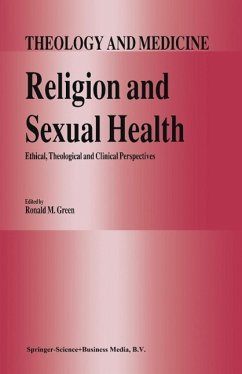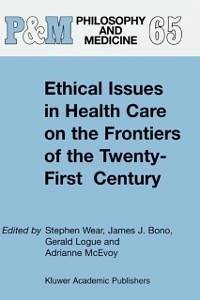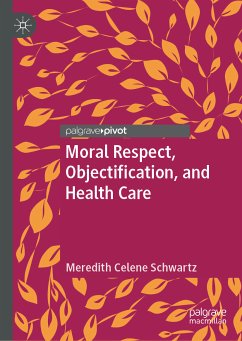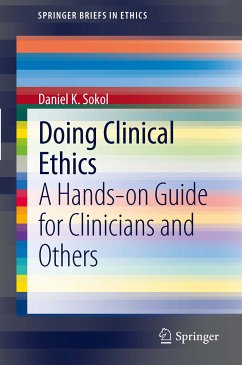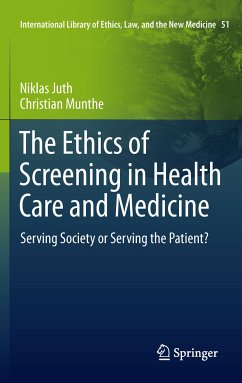
The Ethics of Screening in Health Care and Medicine (eBook, PDF)
Serving Society or Serving the Patient?
Versandkostenfrei!
Sofort per Download lieferbar
112,95 €
inkl. MwSt.
Weitere Ausgaben:

PAYBACK Punkte
56 °P sammeln!
Medical or health-oriented screening programs are amongst the most debated aspects of health care and public health practices in health care and public health ethics, as well as health policy discussions. In spite of this, most treatments of screening in the research literature restrict themselves to isolated scientific aspects, sometimes complemented by economic analyses or loose speculations regarding policy aspects. At the same time, recent advances in medical genetics and technology, as well as a rapidly growing societal focus on public health concerns, inspires an increase in suggested or...
Medical or health-oriented screening programs are amongst the most debated aspects of health care and public health practices in health care and public health ethics, as well as health policy discussions. In spite of this, most treatments of screening in the research literature restrict themselves to isolated scientific aspects, sometimes complemented by economic analyses or loose speculations regarding policy aspects. At the same time, recent advances in medical genetics and technology, as well as a rapidly growing societal focus on public health concerns, inspires an increase in suggested or recently started screening programs.
This book involves an in-depth analysis of the ethical, political and philosophical issues related to health-oriented screening programs. It explores the considerations that arise when heath care interacts with other societal institutions on a large scale, as is the case with screening: What values may be promoted or compromised by screening programs? What conflicts of values do typically arise - both internally and in relation to the goals of health care, on the one hand, and the goals of public health and the general society, on the other? What aspects of screening are relevant for determining whether it should be undertaken or not and how it should be organised in order to remain defensible? What implications does the ethics of screening have for health care ethics as a whole?
These questions are addressed by applying philosophical methods of conceptual analysis, as well as models and theories from moral and political philosophy, medical ethics, and public health ethics, to a large number of ongoing and proposed screening programs which makes this book the first comprehensive work on the ethics of screening. Analyses and suggestions are made that are of potential interest to health care staff, medical researchers, policy makers and the general public.
This book involves an in-depth analysis of the ethical, political and philosophical issues related to health-oriented screening programs. It explores the considerations that arise when heath care interacts with other societal institutions on a large scale, as is the case with screening: What values may be promoted or compromised by screening programs? What conflicts of values do typically arise - both internally and in relation to the goals of health care, on the one hand, and the goals of public health and the general society, on the other? What aspects of screening are relevant for determining whether it should be undertaken or not and how it should be organised in order to remain defensible? What implications does the ethics of screening have for health care ethics as a whole?
These questions are addressed by applying philosophical methods of conceptual analysis, as well as models and theories from moral and political philosophy, medical ethics, and public health ethics, to a large number of ongoing and proposed screening programs which makes this book the first comprehensive work on the ethics of screening. Analyses and suggestions are made that are of potential interest to health care staff, medical researchers, policy makers and the general public.
Dieser Download kann aus rechtlichen Gründen nur mit Rechnungsadresse in A, B, BG, CY, CZ, D, DK, EW, E, FIN, F, GR, HR, H, IRL, I, LT, L, LR, M, NL, PL, P, R, S, SLO, SK ausgeliefert werden.




